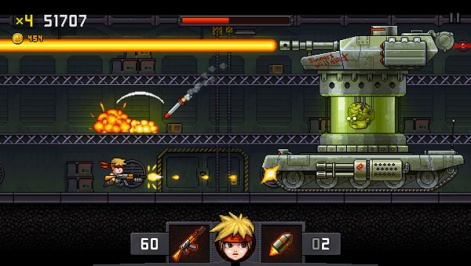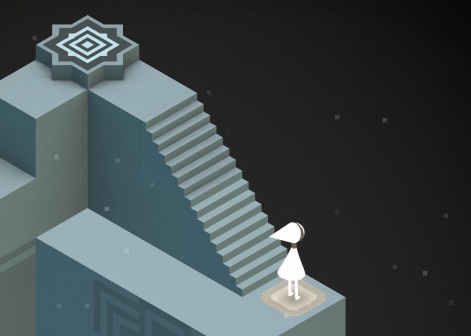London-based indie studio ustwo started off the new year by revealing that only five percent of Monument Valley's installs on Android were paid for. Compare this with the 40 percent of paid-for installs on iOS.
Ustwo made clear that this figure doesn't count the installs of the game on the Amazon App Store during the Christmas period, where it was officially available for free for a short time.
But it does include a number of "legitimate" installs but this, more than likely, doesn't amount to many.
While it's unclear what this figure actually implies regarding the rate of piracy on mobile platforms, especially Android, it has raised the subject for debate once again. Ustwo itself has said that it's not complaining about these figures by sharing them, only that they are "interesting."
But what do other indie studios have to say about the matter? Well, as you know, we happen to have our Indie Mavens to turn to at such a time. And so, we asked them the following question:
"Do piracy figures such as those recently released by ustwo regarding Monument Valley put you off releasing paid games on mobile, especially Google Play?"
I'm just starting up and deciding where to launch my games. This puts me off Android a lot and not only paid games but F2P too.
If piracy is this bad then they will pirate/cheat/steal anything on F2P too so I'm unlikely to make any money and it doesn't feel worth my while to consider at Android at all.
We are targeting F2P and Free with ad support these days. Even Joan Mad Run, which we are hopefully releasing in couple of months, will probably be free (although, not with an 'evil' F2P scheme). Yet, the piracy by itself isn't the main reason for that.
That's just the trend and the overall state of the industry that has lead to free games being way more profitable. Also, being free is easier to get user attention if you're a little game studio. Paid games can rarely be a success, unless they already have a strong fan community and/or pay off the paid traffic/ads.

However, I think the platform holders of iOS and Android have to help developers by providing proper tools to effectively stand against piracy. Before iOS 8 we used an extra check that could tell us (in the runtime) whether or not the game is being pirated with 100 percent accuracy (by checking binary encryption signatures).This option, unfortunately, is no longer available. The only way to do this on iOS now is to use a smart IAP validation. But you can't reliably detect piracy of a paid game in runtime now.
To Android, or to not, is a different question.
It depends on what you are using to create a game. While using a cross-platform SDK it's unwise not to release on Android too, even if the release follows the main iOS release after some time later.
If some kid in Mongolia doesn't have a credit card and wants to pirate my games, I'm okay with that.Justin Smith
How many of this 95 percent are actually lost sales? It's impossible to tell. The figure doesn't put me off releasing paid games. If some kid in Mongolia doesn't have a credit card and wants to pirate my games, I'm okay with that.
My Android sales used to be abysmal compared to iOS, but they're slowly catching up. There's no way I'd forgo making an Android version of a game because of a scary big number. Doomsaying piracy stories have been told since times of yore, on every platform.
I'm not against switching to an ad-supported model if I ever design a game that would be improved by having ugly distracting ads all over it.
The problem is not limited to Android. We've seen piracy rates as high as 98% on PC games we have released. As a creator, it can be discouraging to see that so few people see value in our video games. It doesn't really turn me off releasing a paid game on Android, since it is a really big market.
However, we have seen significantly more revenue from iOS for our games.
It's hard to blame piracy for this discrepancy. I'm not sure that pirating on iOS is significantly harder than on Android. I think it comes down to the profile of consumers in each ecosystem. iOS aims at a premium audience, and Apple customers are more willing to pay for the premium experience that Monument Valley offers.

Piracy exists because it is less painful to steal than it is to pay.Dan Menard
The way I see it, piracy exists because it is less painful to steal than it is to pay. You can either make it more painful to steal (DRM, which tends to hurt everyone), or make it less painful to pay (what Netflix, Steam, and others have managed to do).
Free-to-play games manage to tip the scales in their favor because their games become the digital store front, and they have full control over it. They can tease players with special offers, show them the item shop at just the right time and build a rapport with them because they can identify each of their customers and players.
If you run a F2P game, you are a store owner, and your job is to sell.
Meanwhile premium games are stuck with what the platform-holders provide. The only way I can tease a game on Google Play is with a few screenshots and a video. I have to go through Google for payment processing.
At the end of the day I don't even know who my customer is, because Google keeps all that information. Google and Apple are in the business of hardware, not selling games, and so the tools to market products on their stores are lacking. I'm guessing most Android customers would rather just not deal with that at all.
Piracy becomes the more attractive option.

Jon's focus is on content, working from the initial outline, through the development of the authoring tools, to the writing and scripting of final content.
Previously, Jon was a lead designer at Sony Computer Entertainment Europe, and before that a secondary school teacher, so he loves to talk. He's a published author of short stories and over a decade's worth of award-winning interactive fiction.
We occasionally fantasise about detecting pirated versions and altering gameplay to suit.Jon Ingold
I think we were initially quite alarmed by the idea of piracy, but you soon learn to accept it as part of the business - and software piracy has existed for as long as software has, so it's hard to imagine any way to really avoiding it.
We occasionally fantasise about detecting pirated versions and altering gameplay to suit - in 80 Days, you could be continually pick-pocketed everywhere you go, for instance - but ultimately, the risk of misdetection is too high.
I was interested to see Monument Valley's figures, though, since they're a lot higher than what we've seen, on both iOS and Android.
I think that's probably because 80 Days doesn't play well outside English-speaking markets; the highest piracy rate we've seen is in China, but the average length of play there is less than 60 seconds -- about long enough to get through the intro and see quite how many words there are to read!
I think server-based multiplayer stuff is the only sane way to really deal with piracy at the moment. It's tremendously difficult for anyone making a single player game: it's inescapable really.
For most indie games, though, the key problem they face is still reach; piracy does increase that in some ways, so there is an upside. That definitely doesn't legitimise piracy, though.
It's expected. Players who have pirated it would not buy it anyway. Games should be free to try, then multiplayer or extra parts should be paid-content.

Jon's focus is on content, working from the initial outline, through the development of the authoring tools, to the writing and scripting of final content.
Previously, Jon was a lead designer at Sony Computer Entertainment Europe, and before that a secondary school teacher, so he loves to talk. He's a published author of short stories and over a decade's worth of award-winning interactive fiction.
Vadim, I like that model too, but it's hard to ask developers to go that route when mobile prices are so low anyway.
And I'm fairly sure more people have played a full 80 Days game because the paywall was upfront than would have if we'd had a wall in the middle of a free app. (I can't prove that, of course, but that's my sense.)



























